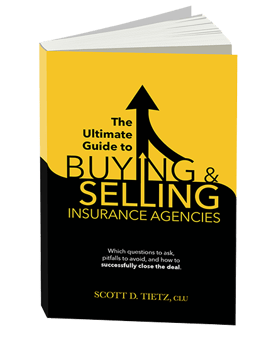We all have brand new goals we can’t WAIT to tackle. Many will make a huge push in January and then unfortunately, slip back into the same old patterns of doing business. Would you like to change that? To see a positive difference in your profits and your people this year?

If you said yes, that's great news. But here’s the harsh reality -- if you ONLY work IN the business versus ON the business too, you’ll never get off the working-really-hard-but-not-going- anywhere treadmill. And it will be reflected in your employees’ attitudes and results and ultimately, the amount of profit the business produces. Here’s why:
It’s actually in some of the non-revenue generating activities that an agency can position themselves to succeed at much higher levels.
For this post, we’ll focus specifically on the marketers or wholesalers that you employ in your business.
What can you do to help them be better in their roles so they achieve personal satisfaction while improving your business at the same time?
And we’re not talking just a surprise, one-off spike in business but seeing immediate positive change that continues to compound over time.
First, ask yourself these questions
Do I keep having the same discussions about goals we need to meet (and we keep missing the mark)?
Is there a lot of blaming and complaining going on?
Am I reacting to similar problems, day in, day out?
Are the salaries I’m paying being reflected in the growth of the company?
Do we have a system for achieving results or is it more ‘throw spaghetti at the wall and see what sticks’ instead?
Answers to these questions reveal just how necessary a new approach is.
An underutilized way to see dramatic results in your agency
That new approach is to invest in professional development. Now, it might be hard to wrap your head around how that REALLY matters to the bottom line, but I want you to consider something very important.
What any of us can accomplish is a direct reflection of the thoughts we think. Our personal and professional development is key to getting incrementally better every day.
For agencies that aren't at the uppermost level they'd like to be — the owner and the people they employ cannot, I repeat, cannot keep doing the same exact things they’ve always done with the same exact knowledge, skill level and mindset if they want ANY chance of producing different results.
OK, I hope I have your attention because I want to give you some ideas for cultivating those different, better results we all strive for.
The one key that unlocks more potential in your business
The good thing is, it doesn’t have to be this huge change in what you do or what you provide for your marketers and wholesalers. If you’ve heard of the kaizen method, it’s about improving incrementally each day.
Just like an advisor might suggest their client start saving even just a tiny bit now, not only does the compounding effect come into play but it establishes a habit that will serve them in even bigger ways in the future.
Likewise, professional development is absolutely dependent on the habits we create and systems we put in place. Attending a conference every quarter or even every year, establishes a habit of professional development. And habits are the key to change.
By putting consistent personal and professional development in place as a system — we establish a way to create and sustain the results we want in our business. And I say personal AND professional because in all honesty, it’s hard to grow professionally when you aren’t willing to work on yourself personally as well. Each tend to influence the other.
For those that will go on to become star players and help you move the needle in your business, I don’t foresee push-back from suggesting they participate in professional development activities. Humans have a natural desire to constantly improve. For some, it may seem that desire is dormant, but it’s there and not fulfilling it shows up in negative ways that can contribute to setbacks in your business.
It’s a scary thought, but these negative implications could show up in giving out misinformation, not answering the phone, not making necessary calls to drive business. It can happen. And there’s a good chance it’s tied to how the people you hire feel about where they stand both personally and professionally. Now hopefully, you don’t have people like that in your business — at least not to that extreme but implementing personal and professional growth can work to prevent situations like that.
Next, we’ll outline seven key areas of development.
Seven areas of professional development that lead to bigger results
1. Mindset- This is the first area to focus on because LITERALLY no technique or knowledge or best practice will be anywhere NEAR as effective without the right mindset. We've witnessed truly talented people hold themselves back because they didn’t have the mindset of a successful person. What’s important for this discussion is for us to instill a “growth mindset” in that of our marketers. Author, Carol Dweck, defines a growth mindset in this way:
“In a growth mindset, people believe that their most basic abilities can be developed through dedication and hard work—brains and talent are just the starting point. This view creates a love of learning and a resilience that is essential for great accomplishment.”
2. SMART Goals- I know there are some out there who say SMART goals are dumb, but here’s the thing… it’s really hard to know whether you’ve actually accomplished the goal and how to tackle it without this framework.
As a reminder, that’s goals that are:
- Specific
- Measurable
- Achievable
- Relevant
- Timely
3. Repeatable Systems and Techniques- If your marketers don’t have a consistent sales process to follow from qualifying a lead to converting them to a contracted agent, a marketer training could help them learn to implement one.
A sales process can help create a more consistent experience for your prospective and existing agent base as well as help you identify when something isn’t working. It’s hard to know where the issues are if everyone is doing their own random routine.
4. Skill at Uncovering Pain Points – Ok, you might be wondering what in the world this is about. Well, uncovering pain points is a tactic in marketing that allows you to serve up exactly what people need. By identifying the problem they have, you can better position your solution.
Training your marketers to gather intel about what issues your agents are encountering allows your business to provide more relevant solutions AND it helps inform your marketing efforts as well, drawing in the right type of agent — one that you can help. The ability to do this — to draw out pain points customers (producers) have — takes a higher degree of skill from a marketer. Many rely on email and text today but those that want to stand out (and fight commoditization of their role) may want to work on honing soft skills like communication, which is a dying art.
5. Leveraging Tech- We know some people in our industry might fear change and might want to do things “the way we’ve always done them,” but those are not the people who will carry our industry into the next decade. They just aren’t. Marketers should be trained on and be able to use and instruct agents on implementing new technologies into their own business for efficiency and accuracy.
6. Expansive Product Knowledge- Although it’s good to be a specialist rather than a generalist, marketers who are most successful typically have a broad working knowledge of various product types from LTC to annuity to life insurance, which allows them to at least steer an agent in the right direction for answers.
This also comes in handy when you want to get the most out of cross-selling opportunities in your agency.
7. Innovative Sales Ideas – We’re always looking for the latest and greatest, right? Opening your marketers’ minds to new ideas can set your agency up as a thought leader. It can be easy to push the same old tired strategies, especially when we see and talk to the same people or read the same articles as everyone else. However, just being around new people and getting inspired by different perspectives can spark a new idea to bring back to the office.
Final thoughts…
Personal and professional development can help improve morale because it boosts an individual’s self-confidence.
The new ideas and strategies shared at a marketer training can reinvigorate and inspire an employee. And we know that happier employees, produce better work.
Not to mention, your people are the face of your organization. If they are bored or unmotivated, it is absolutely going to show up in their daily life and be apparent to whomever they interact with.
What would that say to prospective or existing agents or carriers that you want to work with?
By investing time and/or money in professional development initiatives, you send an extremely important message to your team — you are valued. Arranging for them to attend trainings or conferences lets them know that you think they’re worth it, you care about their career growth and you BELIEVE they can achieve great things if given the right tools.
You might be surprised at what an impact that makes on the revenue-generating aspects of your business.
To learn more about how marketer trainings and universities can be instrumental in growing profitability in your agency this year, click below:






